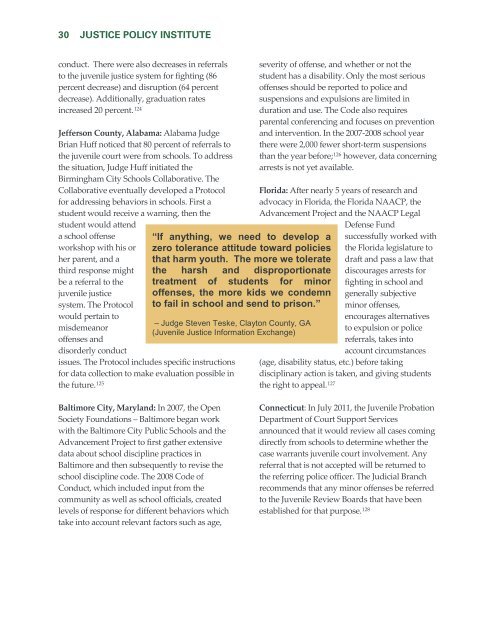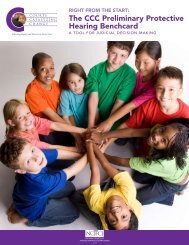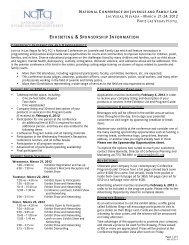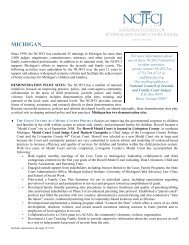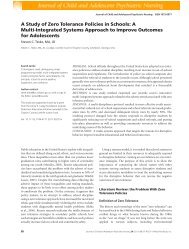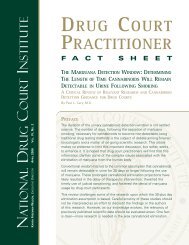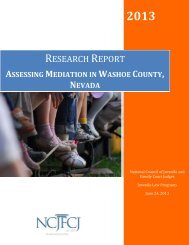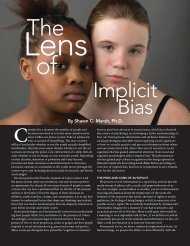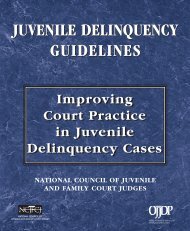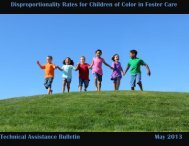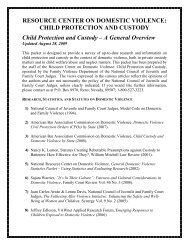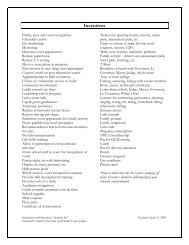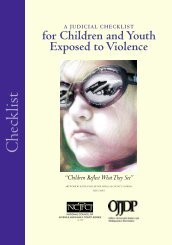EDUCATION UNDER ARREST: - Justice Policy Institute
EDUCATION UNDER ARREST: - Justice Policy Institute
EDUCATION UNDER ARREST: - Justice Policy Institute
- No tags were found...
Create successful ePaper yourself
Turn your PDF publications into a flip-book with our unique Google optimized e-Paper software.
30 JUSTICE POLICY INSTITUTEconduct. There were also decreases in referralsto the juvenile justice system for fighting (86percent decrease) and disruption (64 percentdecrease). Additionally, graduation ratesincreased 20 percent. 124Jefferson County, Alabama: Alabama JudgeBrian Huff noticed that 80 percent of referrals tothe juvenile court were from schools. To addressthe situation, Judge Huff initiated theBirmingham City Schools Collaborative. TheCollaborative eventually developed a Protocolfor addressing behaviors in schools. First astudent would receive a warning, then thestudent would attenda school offenseworkshop with his orher parent, and athird response mightbe a referral to thejuvenile justicesystem. The Protocolwould pertain tomisdemeanoroffenses anddisorderly conductissues. The Protocol includes specific instructionsfor data collection to make evaluation possible inthe future. 125“If anything, we need to develop azero tolerance attitude toward policiesthat harm youth. The more we toleratethe harsh and disproportionatetreatment of students for minoroffenses, the more kids we condemnto fail in school and send to prison.”– Judge Steven Teske, Clayton County, GA(Juvenile <strong>Justice</strong> Information Exchange)severity of offense, and whether or not thestudent has a disability. Only the most seriousoffenses should be reported to police andsuspensions and expulsions are limited induration and use. The Code also requiresparental conferencing and focuses on preventionand intervention. In the 2007-2008 school yearthere were 2,000 fewer short-term suspensionsthan the year before; 126 however, data concerningarrests is not yet available.Florida: After nearly 5 years of research andadvocacy in Florida, the Florida NAACP, theAdvancement Project and the NAACP LegalDefense Fundsuccessfully worked withthe Florida legislature todraft and pass a law thatdiscourages arrests forfighting in school andgenerally subjectiveminor offenses,encourages alternativesto expulsion or policereferrals, takes intoaccount circumstances(age, disability status, etc.) before takingdisciplinary action is taken, and giving studentsthe right to appeal. 127Baltimore City, Maryland: In 2007, the OpenSociety Foundations – Baltimore began workwith the Baltimore City Public Schools and theAdvancement Project to first gather extensivedata about school discipline practices inBaltimore and then subsequently to revise theschool discipline code. The 2008 Code ofConduct, which included input from thecommunity as well as school officials, createdlevels of response for different behaviors whichtake into account relevant factors such as age,Connecticut: In July 2011, the Juvenile ProbationDepartment of Court Support Servicesannounced that it would review all cases comingdirectly from schools to determine whether thecase warrants juvenile court involvement. Anyreferral that is not accepted will be returned tothe referring police officer. The Judicial Branchrecommends that any minor offenses be referredto the Juvenile Review Boards that have beenestablished for that purpose. 128


